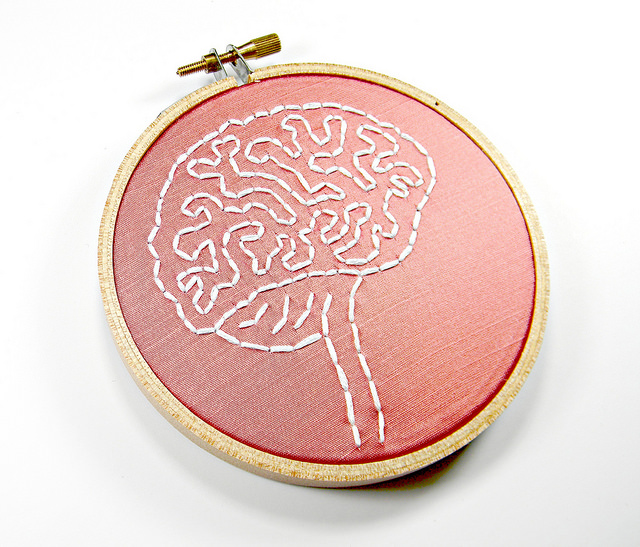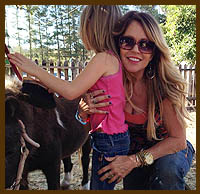
A common goal of contemporary spiritual disciplines is the surrender of ego, which often entails “giving up the past” and learning to “be here now.”
It’s an ideal of spiritual growth that may not be too frightening to consider in the contemplative environment of meditation—after which we can always go back to the ego’s daily business.
But for over 5 million sufferers of Alzheimer’s and other forms of progressive dementia, the loss of ego is not a matter of spiritual choice. As their memories and sense of self progressively fail, they have to deal with the real terror of giving up the self—and then perhaps find a spiritual perspective that helps them negotiate the process.

Kelli McGowan is a 52-year-old grandmother in Marin County, California, who was diagnosed three years ago with frontotemporal dementia (FTD), an aggressive degenerative disorder that she describes as “Alzheimer’s on steroids.”
Recently I talked to Kelli about how her illness has changed her life—and how her spiritual discipline, A Course in Miracles, is helping her comprehend and cope with such a profound challenge.
“I went from being very loving and living life to the max,” Kelli recalls, “to being apathetic and having no energy, to saying mean things, being aggressive and agitated. I went from being graceful to being clumsy, catching myself on fire and getting hurt while attempting simple tasks like making a cup of coffee. I went from being energetic to being flat. I went from being very productive and intelligent to being confused and disoriented. I went from being a high-fashion dresser to being someone who needed five or six attempts just to get leggings on, and then I needed help. I went from being deeply involved in the world to hardly leaving the house, because it’s hard to be out, or be in groups.”
Kelli feels that her discipline helped her with some of her initial behavior problems because “I’m reminded that minds are always connected… I’ve blurted out some very weird things, so when that happens, I try to be honest about it and clean it up immediately. I’ll call and say, ‘I don’t like the way I did that and I love you,’ instead of pretending that nothing happened. This is important because people with Alzheimer’s or dementia, and the people around them, can easily become afraid or exasperated, and want to pretend that certain things aren’t happening. So I try to be open and honest and navigate through all this with as much grace and dignity as I can, so that other people don’t have to feel uneasy or guilty.”

According to the Alzheimer’s Association, Alzheimer’s and other dementias will cost the US $226 billion in 2015, a cost that could rise as high as $1 trillion by 2050. It is the most expensive disease in America. While dementias are generally associated with the elderly, Alzheimer’s has been known to strike people in their thirties, and about 200,000 people with the diagnosis are under 65 (the figures are higher for FTD, which tends to strike even younger). About two-thirds of sufferers are women. Alzheimer’s is the sixth leading cause of death in the US, and the only cause among the top 10 that cannot be cured, prevented or slowed down.
There are some alternative approaches to dealing with dementias, among them yoga and qigong. “My balance is way off, so even beginner yoga is a big challenge for me,” Kelli reports. “I feel like I have sand bags on my arms and legs. I get stiff and have tremors. All this is a massive contrast to my life before the diagnosis, but I refuse to be a victim.” Kelli has been active in supporting national legislation to increase funding and research for Alzheimer’s.
Admitting there have been times when she’s wanted to give up, Kelli says her inner guidance enabled her to “take a deep look at all this, and I got the message that ‘this is here for you to love yourself when you’re not perfect.’ I’m using my situation for my awakening, and that means bringing light to all of it, even the idea of my life ending. I mean, we’re all facing this; it’s not personal. Everything has an expiration date. It’s my divine process to make this dance with dementia an adventure, and learn to love it. I can even laugh at some of my difficulties and behaviors because there’s some really funny stuff going on sometimes.”
“Years ago I promised to undo as much of my ego in this lifetime as I could, and guess what: This has been my best opportunity so far to get it done. I’m trying to use all of this as an opportunity to awaken. There’s absolutely nothing I can’t bring love to.”
Education and support for those specifically affected by FTD is available from the Association for Frontotemporal Degeneration.
Author: D. Patrick Miller
Editor: Evan Yerburgh
Photos: Flickr and Kelli McGowan








Read 4 comments and reply